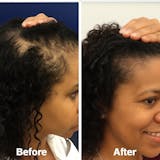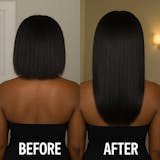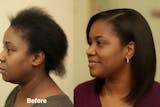Hormone Imbalance and Hair Loss
Struggling With Thinning Hair? Your Hormone Imbalance Might Be the Reason
Hormone imbalances can absolutely cause thinning hair, excessive shedding, and slowed hair growth. When levels of estrogen, progesterone, thyroid hormones, cortisol, or DHT shift, hair follicles respond quickly. Understanding these hormonal changes—and supporting your scalp with circulation-boosting oils like rosemary, peppermint, caffeine, and castor oil—can help reduce shedding, strengthen roots, and restore healthier growth within months.
Introduction: When Hair Thinning Isn’t “Just Age”
Hair loss is one of the most emotionally challenging changes we experience as we age. Many people blame genetics, stress, or simply getting older, but one of the most powerful drivers of thinning hair is something most people don’t fully understand: hormones. Hormones are the body’s chemical messengers. They regulate everything from metabolism to stress to fertility—and yes, they have a profound impact on the hair growth cycle. When hormone levels shift abruptly or gradually over time, the follicles react, often by shrinking, shedding, or slowing down production altogether.
For many women, hair thinning sneaks up slowly during perimenopause or appears suddenly after childbirth. For men, the process often begins subtly in their twenties or thirties and accelerates with age. Regardless of gender, the cause is often the same: a disturbance in the delicate hormonal balance that keeps the hair cycle running smoothly. This blog explores the science behind hormonal hair loss, how it affects both women and men differently, and how natural ingredients—especially growth-supporting oils—can help protect and strengthen the hair you still have.
To understand how hormones disrupt hair, we first need to understand how hair actually grows.

Understanding the Hair Growth Cycle
Hair doesn’t grow continuously. Instead, it moves through a repeating cycle made up of three phases, each influenced by hormones. The first phase, called anagen, is the active growth stage. During this time, the follicle is fully alive, fed by a rich blood supply, and producing new cells that push the hair shaft upward. The length of this phase determines how long your hair can grow; it typically lasts two to seven years but can shorten dramatically when hormones become imbalanced.
After anagen ends, the follicle enters catagen, a short transitional period when growth slows and the follicle begins to shrink. This stage lasts only a few weeks, but it marks the beginning of the follicle’s rest. The third stage, called telogen, is a resting phase where the old hair sits in place until it eventually sheds and makes room for the next growth cycle. Everyone sheds some hairs daily—around 50 to 100 on average—but hormonal changes can push a large number of follicles into telogen at once, leading to noticeable thinning.
When hormones are stable, this cycle operates smoothly. But when major shifts occur—as during menopause, postpartum, chronic stress, thyroid changes, or androgen fluctuations—the cycle becomes disrupted. The follicles may shrink, rest too long, stop producing hair, or shed earlier than usual.
How Hormones Influence Hair Growth
Hormones are some of the most powerful regulators of hair health, and several key hormones play very different roles in determining whether your hair grows strong and full—or weak and thin.
One of the most significant hormones in hair loss is dihydrotestosterone (DHT). DHT is a derivative of testosterone, and while it’s essential for certain developmental processes, it has a downside: it binds to hair follicles and gradually shrinks them. Over time, this miniaturization leads to shorter, thinner, weaker strands until the follicle stops producing hair altogether. This is the primary cause of male pattern baldness, but many women experience DHT-related thinning as well, especially if they have higher androgen levels due to PCOS, perimenopause, or genetics.
On the opposite end of the spectrum is estrogen, the hormone that protects hair. Estrogen prolongs the growth phase and keeps strands thick, shiny, and dense. This is why many women enjoy fuller hair during pregnancy, when estrogen levels peak. But estrogen drops dramatically after childbirth and during menopause, causing a sudden shift in the growth cycle. The result is excessive shedding, thinning at the part line, and a visible decrease in volume.
Another hormone that influences hair is progesterone, which helps balance estrogen and testosterone. When progesterone is low—which is common during perimenopause, PMS, postpartum, or times of chronic stress—DHT levels can rise unchecked. This hormonal imbalance often shows up as shedding around the temples, thinner ponytails, or general loss of density.
The thyroid gland also plays a major role. Both underactive (hypothyroidism) and overactive (hyperthyroidism) thyroid conditions can trigger hair loss. Thyroid hormones regulate metabolism, cellular energy, and the health of skin and hair. When the thyroid is out of balance, the hair cycle slows, leading to dryness, brittle strands, and diffuse thinning across the entire scalp.
Finally, there is cortisol, the stress hormone. Chronic stress increases cortisol levels, which can force hair follicles into the shedding phase prematurely. This type of hair loss, known as telogen effluvium, often appears suddenly and can last for months—even after the stress event is over. Because cortisol directly impacts blood flow and nutrient delivery to the follicles, high stress can prolong shedding cycles and delay regrowth.

Hormonal Hair Loss in Women
Women experience several life stages that heavily influence hormone levels, each with distinct effects on the hair.
Perimenopause and menopause are two of the most significant phases. As estrogen and progesterone decline, the hair’s growth cycle shortens. Strands that were once thick and full become finer over time. Many women notice their part line widening, their edges thinning, and their ponytail shrinking. Because estrogen protects the hair, its decline opens the door for DHT to exert more influence, even at lower concentrations.
Pregnancy and postpartum create another dramatic hormonal shift. During pregnancy, estrogen rises, often giving women thicker, more vibrant hair. However, after childbirth, estrogen levels fall rapidly. This triggers significant shedding as many hair follicles that were “held” in the growth phase suddenly enter the resting and shedding phase at once. Postpartum shedding can be alarming but is usually temporary, although some women continue experiencing diffuse thinning for longer than expected.
Birth control changes also play a role. Starting or discontinuing hormonal contraception alters estrogen and progesterone levels, which can cause temporary shedding or thinning. While this usually stabilizes, it can be distressing if the shift is sudden.
Women with conditions like PCOS, thyroid disorders, or adrenal imbalances may also experience hormonal hair loss as an early symptom.
Hormonal Hair Loss in Men
For men, the relationship between hormones and hair loss is often more straightforward but no less complex. Androgenic alopecia, also known as male pattern baldness, is overwhelmingly driven by DHT. Men with a genetic sensitivity to DHT often see gradual thinning at the temples, crown, or hairline. The follicles in these areas shrink first, producing weaker and shorter strands before stopping altogether.
Testosterone naturally declines as men age, but the conversion of testosterone to DHT often remains active. This imbalance accelerates thinning and makes hair loss more noticeable. Stress, certain medications, weight gain, and lifestyle factors can also influence hormone levels and exacerbate thinning.
Even men without a strong genetic predisposition may experience temporary shedding due to stress, thyroid fluctuations, or major hormonal shifts.

Can Hair Oils Help With Hormonal Hair Loss?
Hair oils cannot change hormone levels, but they can influence the scalp environment, increase circulation, strengthen follicles, reduce inflammation, and help counter the effects of hormonal hair loss. A healthy scalp is essential for resisting miniaturization, slowing shedding, and supporting regrowth.
Caffeine oil is one of the most promising natural ingredients because it has been shown to counteract DHT’s effects on the follicle. It increases blood flow, stimulates follicle activity, and extends the growth phase. For people dealing with hormonal shedding, caffeine oil can help strengthen roots and reduce the rate of fall.
Saw palmetto, whether used orally or topically, is often referred to as a natural DHT blocker. It helps inhibit the enzyme responsible for converting testosterone into DHT. For men and women experiencing crown thinning or androgen-related loss, saw palmetto can be a gentle, natural support option.
Rosemary oil has become one of the most researched natural hair growth ingredients. It improves microcirculation, increases nutrient delivery to follicles, and supports cellular turnover. Some studies even show rosemary performing similarly to minoxidil when used consistently, making it an excellent natural growth booster.
Peppermint oil enhances circulation through its menthol component, creating a cooling effect that stimulates blood flow and increases follicle oxygenation. It also helps calm inflammation on the scalp—a common problem for those experiencing hormonal imbalance.
Castor oil, especially Jamaican Black Castor Oil, is rich in ricinoleic acid, which nourishes the scalp, locks in moisture, and strengthens hair from the root. Its density makes it excellent for sealing hydration into dry strands, especially for women experiencing menopausal dryness or postpartum changes.
Other oils such as jojoba, argan, black seed, fenugreek, and turmeric provide additional benefits by reducing inflammation, softening the scalp, improving follicle health, and reinforcing the skin barrier.
A Supportive Routine for Hormonal Hair Loss
A supportive routine has three main goals:
- improve circulation
- strengthen the scalp
- support moisture and follicle health
A daily routine that includes a light scalp massage helps stimulate blood flow to the follicles. Pairing this with a blend of rosemary, peppermint, caffeine, and castor oil can help nourish and strengthen the roots. Hydration also plays a crucial role; the scalp dries out more easily under hormonal stress, making water intake essential.
Weekly, a gentle cleanse helps remove buildup without stripping natural oils, followed by a deep conditioner that uses heat or steam to penetrate the hair shaft. Using a pre-wash oil treatment can also protect weak, hormonally affected hair from breakage during washing. Mid-week, a light steam treatment helps restore softness and improves moisture absorption.
Monthly, clarifying the scalp helps keep follicles open and reset the scalp environment. Trimming split ends prevents them from traveling upward and causing additional thinning.
Over time, these small habits support the scalp’s health, encouraging fuller, stronger, and more resilient hair—even during hormonal transitions.

Comparison Table — Natural Oils for Hormonal Support
Here is a quick look at how each oil supports hormonal hair loss:
|
Oil |
Key Benefit |
Best For |
How It Helps |
|
Caffeine |
DHT support |
Shedding, weak roots |
Counteracts DHT effects |
|
Rosemary |
Circulation |
Slow growth |
Boosts blood flow |
|
Peppermint |
Oxygenation |
Inflamed scalp |
Improves microcirculation |
|
JBCO |
Moisture |
Brittle strands |
Reinforces scalp barrier |
|
Saw Palmetto |
Natural DHT support |
Crown thinning |
May slow follicle miniaturization |
For the best results, consider using a growth oil that blends rosemary, peppermint, caffeine, and lightweight castor oil—ingredients known for boosting circulation, strengthening follicles, and counteracting hormonal shedding. Consistency matters more than quantity; a few drops massaged into the scalp regularly can create long-term improvement.
Frequently Asked Questions — Hormones & Hair Loss
1. Can hormone imbalance cause sudden hair thinning?
Yes. Hormonal changes can push many follicles into the shedding phase at once, leading to sudden thinning.
2. Which hormones affect hair most?
DHT, estrogen, progesterone, thyroid hormones, and cortisol have the greatest impact.
3. Why does postpartum shedding happen?
After childbirth, estrogen drops abruptly, causing widespread shedding.
4. Does menopause always cause hair loss?
It varies, but many women experience thinning as estrogen declines.
5. Can natural oils reverse hormonal hair loss?
Oils can’t change hormones, but they improve scalp health and support stronger regrowth.
6. How long does it take to see results?
Most people notice improvement within 60–90 days.
7. Do men and women lose hair differently?
Yes. Women typically thin at the part line; men thin at the temples and crown.
8. Is hormonal hair loss reversible?
It can improve significantly with routine, scalp care, and medical support if needed.
9. Should I see a doctor about sudden hair loss?
Yes—especially if accompanied by fatigue, changes in mood, cycle irregularity, or weight changes.
10. Are natural remedies enough?
They help significantly, but hormonal testing may be necessary for severe or persistent symptoms.
Conclusion: Your Hormones Tell a Story—And So Does Your Hair
Hormonal changes can feel overwhelming, but they don’t have to control your confidence. Understanding the relationship between hormones and hair loss is the first step toward taking back your power. Whether you’re navigating menopause, postpartum shifts, thyroid concerns, high stress, or age-related hormonal changes, your hair can grow healthier and stronger with the right support.
Circulation-boosting oils, consistent scalp care, stress reduction, and patience form a powerful combination. Your hair is a reflection of your inner health and your life journey, not just a measure of youth. With the right routine and the right knowledge, you can support your follicles, strengthen your strands, and embrace every new chapter with confidence.













